On December 4, Deputy Prime Minister Le Thanh Long signed a directive from the Prime Minister to advance workforce training for the semiconductor industry and core digital technologies.
Under this directive, the Ministry of Education and Training (MoET) has been tasked with developing a standardized curriculum for semiconductor engineering, to be completed by the first quarter of 2025.
The ministry will also review and propose revisions to policies on tuition fee waivers, scholarships, and financial aid for students in semiconductor and core digital technology fields, both domestically and internationally, by the fourth quarter of 2025.
The directive emphasizes the need to create a collaborative training model involving the government, universities, and enterprises to cultivate talent for these industries.

International collaboration and high-quality training
MoET will finalize proposals for developing high-quality human resources, including establishing centers of excellence in 4.0 technologies. It will also foster an environment conducive to international cooperation, facilitating the exchange of experts and lecturers in semiconductor and digital technology fields at higher education institutions.
The Ministry of Information and Communications (MIC) has been tasked with promoting awareness of the importance of human resource training for the semiconductor industry and forecasting workforce demand for this sector through 2030. MIC will also develop shared tools and platforms for training semiconductor design and development professionals, to be completed by late 2025.
Focus on semiconductor products and core digital technologies
The Ministry of Science and Technology (MoST) will guide universities and research institutes in integrating advanced research and training in semiconductors and digital technologies. By the first quarter of 2025, MoST will enhance support for R&D activities and form strong research groups while fostering young researchers and potential tech startups.
MoST will also prioritize programs and projects tied to the development of semiconductor products and technologies, linking them with workforce training in universities, research centers, and innovation hubs.
Strategic investments in research and development
The Ministry of Planning and Investment (MPI) will identify and support priority projects for semiconductor laboratories, aligning investments with market demands and legal frameworks. Additionally, MPI will propose policies to attract resources, including talent and experts, and establish shared-use facilities for research and training.
Provinces and cities are tasked with forecasting local workforce needs in the semiconductor and digital sectors and crafting tailored plans through 2030 to develop skilled labor in line with local conditions.
By emphasizing workforce development in semiconductors and digital technologies, Vietnam is positioning itself as a competitive player in global technology markets. The government’s directive underscores the importance of international cooperation, innovative educational models, and strategic investments in research infrastructure to achieve these goals.
Thu Hang